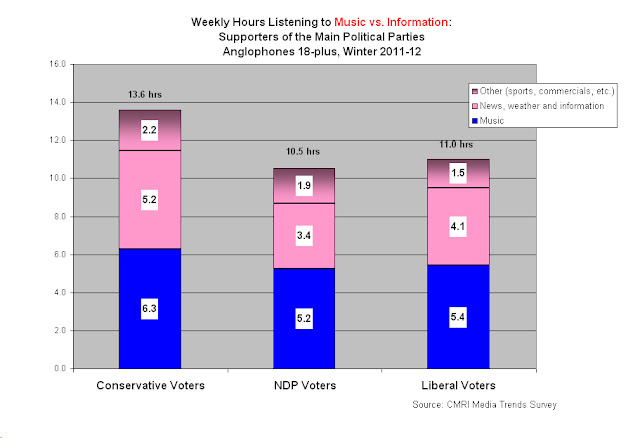How much time do we spend listening to music on the radio compared to news, weather, information, sports or commercials? Music has been a staple of the radio industry since the late 1950's, when TV assumed the primary role of entertaining the family with drama and comedy programs that had once been on radio. Many analysts believe that radio is nothing more than a juke box and that other programming content is of secondary importance. But CMRI's surveys reveal that music is but one element of a complex medium for most listeners. People are using radio not just to listen to music but to understand the world around them, their community and basic things that affect their lives.
 In an earlier post on why people listen to radio it was hypothesized that: "The human voice is the primary feature of the radio that attracts listeners. Male voices, female voices, local and foreign accents; old and young, intelligent, witty, knowledgeable, worldly, dignified...inquisitive, opinionated, mocking, gossipy, condescending voices, the human voice is the essential feature of the radio listening experience. The voice, expressing facts, ideas, meaning and emotions, is compelling and it draws us to the radio."
In an earlier post on why people listen to radio it was hypothesized that: "The human voice is the primary feature of the radio that attracts listeners. Male voices, female voices, local and foreign accents; old and young, intelligent, witty, knowledgeable, worldly, dignified...inquisitive, opinionated, mocking, gossipy, condescending voices, the human voice is the essential feature of the radio listening experience. The voice, expressing facts, ideas, meaning and emotions, is compelling and it draws us to the radio."
 In an earlier post on why people listen to radio it was hypothesized that: "The human voice is the primary feature of the radio that attracts listeners. Male voices, female voices, local and foreign accents; old and young, intelligent, witty, knowledgeable, worldly, dignified...inquisitive, opinionated, mocking, gossipy, condescending voices, the human voice is the essential feature of the radio listening experience. The voice, expressing facts, ideas, meaning and emotions, is compelling and it draws us to the radio."
In an earlier post on why people listen to radio it was hypothesized that: "The human voice is the primary feature of the radio that attracts listeners. Male voices, female voices, local and foreign accents; old and young, intelligent, witty, knowledgeable, worldly, dignified...inquisitive, opinionated, mocking, gossipy, condescending voices, the human voice is the essential feature of the radio listening experience. The voice, expressing facts, ideas, meaning and emotions, is compelling and it draws us to the radio."CMRI's Media Trends Survey has tracked usage and attitudes toward Canadian media, TV, radio and the internet, for the past ten years. Since 2007 we have examined radio listening habits in depth to better understand why people listen to the radio. We keep it simple for survey respondents. We ask them a series of questions about their primary reasons for using radio. We also ask them how much time in a typical week they spend listening to radio and what percentage goes to music, news, sports, etc.
The chart below shows that all radio listeners, as well as CBC Radio 1 and 2 listeners, consistently say that music is a primary reason for tuning into the radio. Only local news (not shown) is comparable as a primary reason to listen.
The Media Trends Survey shows that in winter 2011-12 the average person listened to radio for some 11 hours per week. This includes people who report not listening to radio at all, which brings the average down slightly. Music comprises exactly half (5.5 hours) of the 11.0 weekly hours Canadians spend listening to the radio. News, weather, information, sports, commercials, etc. also account for 5.5 hours per week.
Radio listening is dramatically affected by age. Younger people aged 18-34 listen to radio for only about one-third as much as persons aged 55-plus. Teens and kids listen to so little radio they are usually not even measured in surveys. Male and female listeners are very similar, listening for about the same total hours per week, with roughly equal proportions of music versus information. With the exception of younger listeners, who spend a greater proportion of their radio listening with music, virtually all population groups spend equally large proportions of their listening hours with both music and information.
Not unexpectedly, CBC Radio 1 and Radio 2 listeners are much heavier consumers of radio, at 14-15 hours per week, well above the average of the population. Note that the data reflect all their radio listening, not just hours spent with CBC radio. Both Radio 1 and Radio 2 listeners spend a considerable number of weekly hours with music but in both cases the majority of their listening goes to information content of one type or another.
People who own iPads, use Facebook, own an iPod or a smartphone are just below average when it comes to total weekly hours listening to radio, demonstrating once again that new media do not necessarily replace older media. The exceptions to the rule are people who download video/music to their smartphone, however, this group makes up only about 1 in 20 people. And, another group who listens to the radio less is those who tweet, who must be too consumed with swimming in the tweet stream to turn on the radio.
Finally, those who vote for the three main political parties are pretty much alike in terms of their radio listening. Supporters of all three parties spend roughly the same amount of time listening to music on the radio. Conservative supporters are slightly heavier radio users and they spend more of that extra listening time with information rather than music.




No comments:
Post a Comment